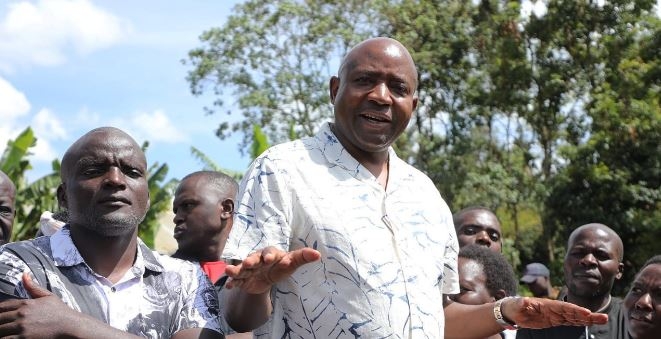
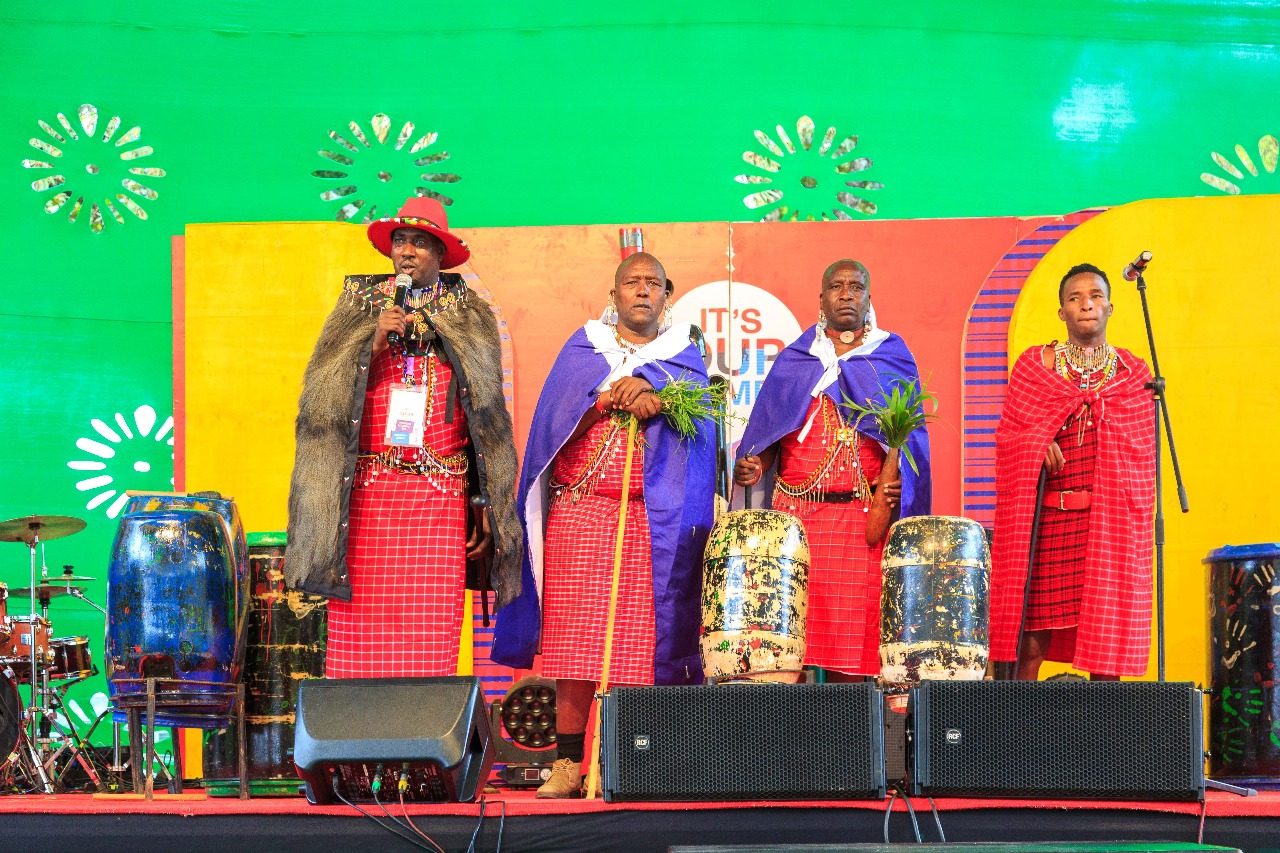 Participants during the Wakati Wetu festival at Entim Sidai in Nairobi, Kenya./HANDOUT
Participants during the Wakati Wetu festival at Entim Sidai in Nairobi, Kenya./HANDOUT
On a sun-drenched morning at the Entim Sidai Wellness Sanctuary, the tranquil grounds came alive with music, memory, and movement as Africa's first-ever reparations festival officially opened. But this was not a gathering for gentle reflection. It was a reckoning.
"Reparations is first an act of moral autopsy and then moral exorcism," declared acclaimed Kenyan author Yvonne Adhiambo Owuor in a keynote address that set the tone for two days of unflinching truth-telling, cultural celebration, and radical reimagining of what justice could mean for a continent still living in colonialism's long shadow.
Wakati Wetu—Swahili for "It's Our Time" brought together hundreds of artists, musicians, activists, policymakers, and cultural leaders from across Africa and the diaspora, marking the launch of the African Union's Decade of Reparations (2026-2036).
Confronting the Silence
What made those October days historic was not just the conversations happening inside conference rooms, but the determination to drag them into the light. For years, reparations discussions have been siloed and not adequately socialized, organizers noted. Unlike traditional conferences, Wakati Wetu Festival aimed to take the reparations debate out of official spaces and into the public sphere.
And the public sphere needed to hear what Owuor had to say.
In her searing opening keynote, titled "Confronting the Silence," the award-winning novelist challenged the very frameworks within which reparations are discussed. The framing of reparations has long positioned Africa as supplicant, she argued expected to beg, to prove harm, to negotiate terms set by those who inflicted the wounds.
"Why would we want to integrate reparations into development, fold justice back into the very economic model that produced injustice?" she asked, her words met with murmurs of recognition throughout the sanctuary.
Owuor rejected what she called the tendency to collapse African history into development constraints or sustainable development goals.
"African history cannot be collapsed into strategy where dehumanization, racialization, plunder, cannibalism, trafficking of humans and organs becomes development constraints," she stated. "This becomes semantic laundering of horror, as if atrocity can be retrofitted into sustainable development goals."
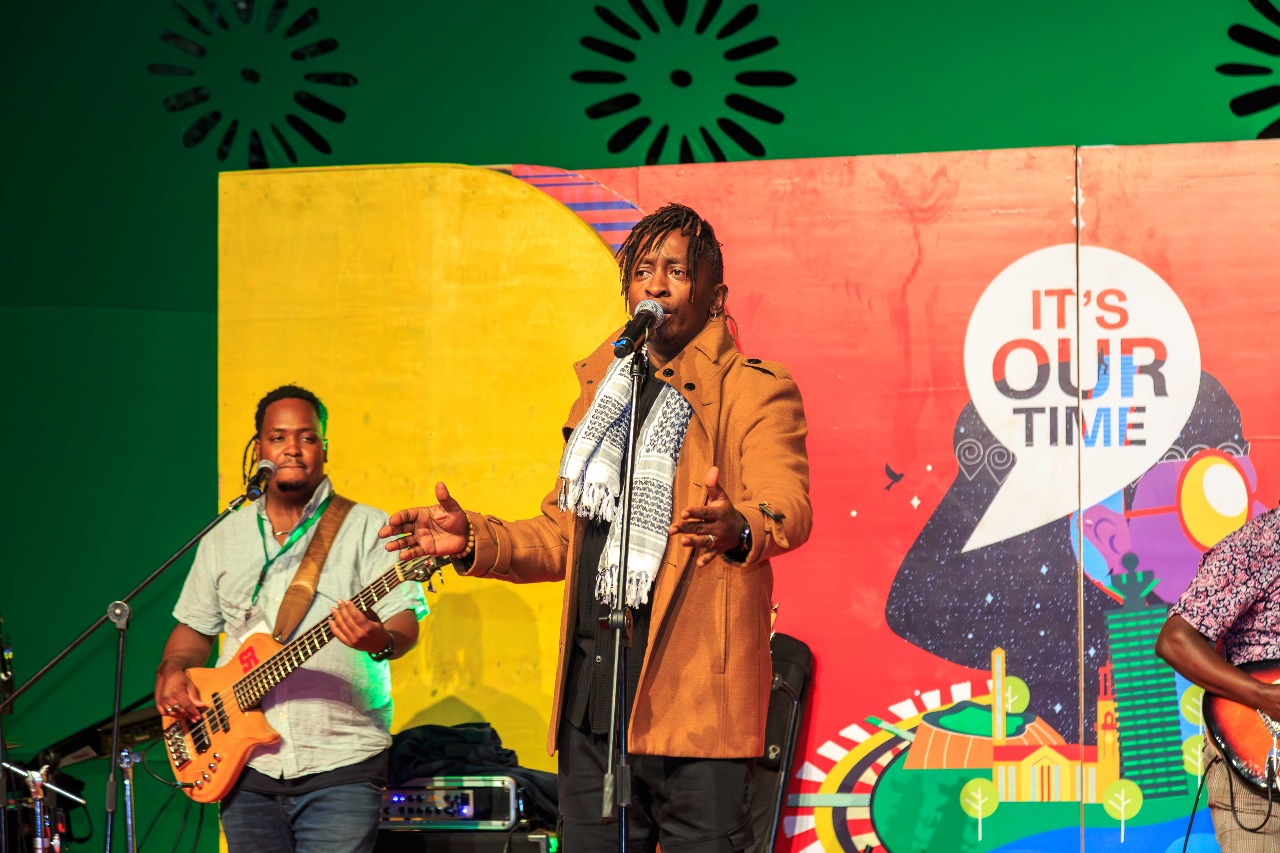 Singer Erick Wainaina performs during the Wakati Wetu festival at Entim Sidai in Nairobi, Kenya./HANDOUT
Singer Erick Wainaina performs during the Wakati Wetu festival at Entim Sidai in Nairobi, Kenya./HANDOUTThe Wound Must Be Named
Perhaps most powerfully, Owuor insisted that repair cannot happen without truth. "Repair begins with the truth, to strip away all illusions so that what is being healed is the wound itself," she said. "There is no repair or healing without walking into, around, and naming the wound in its fullness."
She reminded the audience that modern forensic economics now allows precise calculation of centuries-old debts unpaid royalties, interest, profits from enslaved labor, and recompense for environmental externalities that continue to poison African land and people. "Obligations remain enforceable when harm can be quantified," she declared.
The question, then, was not whether reparations are owed, but whether those who owe them and those who are owed have the courage to face historical truth.
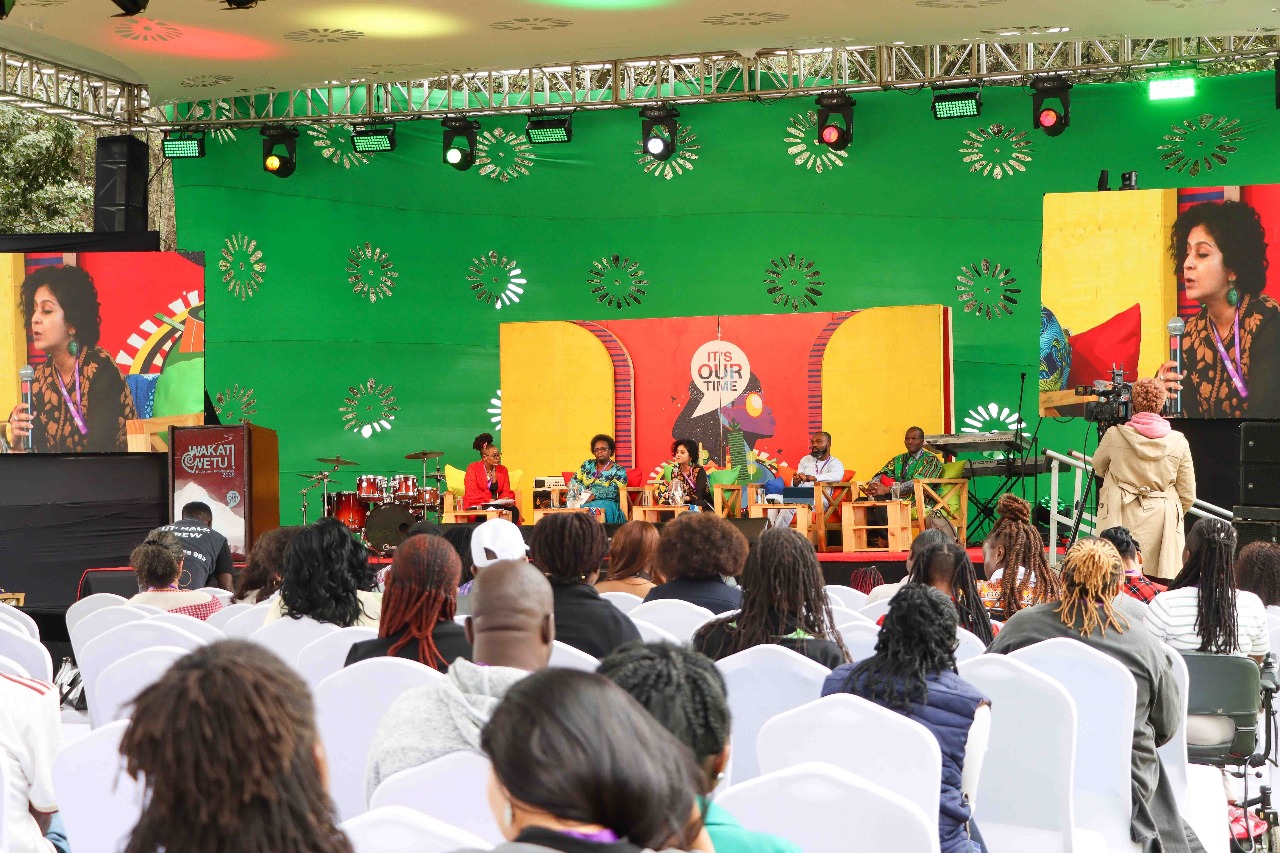 Participants during the Wakati Wetu festival at Entim Sidai in Nairobi, Kenya./HANDOUT
Participants during the Wakati Wetu festival at Entim Sidai in Nairobi, Kenya./HANDOUTThe festival's urgency became even clearer when viewed through the lens of climate justice. As Amnesty International's Racial Justice Advisor Rym Khadhraoui noted, "we often think about colonialism as something that's finished, but we are still living in its long shadow;" a shadow that now extends into climate vulnerability.
In the Ubuntu Room's roundtable on Climate Justice, activists dismantled false solutions being imposed on the Global South. Erica Njuguna from KAYA exposed how carbon markets create "tickets to pollute for corporates and global North governments, who really do not want to reduce their own emissions," while further displacing indigenous communities.
Omar Elmawi emphasized the need to reclaim the climate discourse: "It's important that we really define what climate or the climate discourse for the continent is, because we have been hijacked by the conversation from the global north."
According to Oxfam's figures shared at the session, 70% of all climate finance has been given as debt, further exacerbating the crisis in the Global South.
Elmawi explained the vicious cycle: "Our governments are getting in bed and accepting these deals that are not necessarily helping us because the debt they owe to international financial institutions is so big that they have to concentrate first on how they are going to be paying the interest and the installments in the short term before they can start worrying about the long term."
Esther Mwaniki cut to the heart of the matter: "At the core of the climate justice conversation is a fight for our imagination, and being able to liberate our imagination from what has been forced on us. There is no way the West will ever create the solutions for this problem."
Recent research from NYU Law and UCLA Law on Haiti demonstrates how colonial history directly shapes climate injustice, showing how histories of colonization and racial injustice create climate vulnerability.
Similarly, a groundbreaking study on Cameroon reveals that German colonial exploitation including massive deforestation, displacement of traditional crops, and creation of vast monoculture plantations led to an economic system that continues to rely on export crops, resulting in further destruction of tropical forests and high climate vulnerability.
The study calculates that Germany would need to pay roughly €38 billion to Cameroon alone to account for climate reparations, demonstrating that these are not abstract moral arguments but quantifiable debts. The report emphasizes that reparations cannot be confused with development aid, which usually perpetuates subordination and colonial rules. Reparations instead are a way of liberation.
These cases underscored what Owuor was articulating at Wakati Wetu: the countries bearing the brunt of climate change contributed least to global emissions, while those responsible have the resources to address these challenges. This is not coincidence, it is consequence.
Following the Money: Tax Justice and Illicit Financial Flows
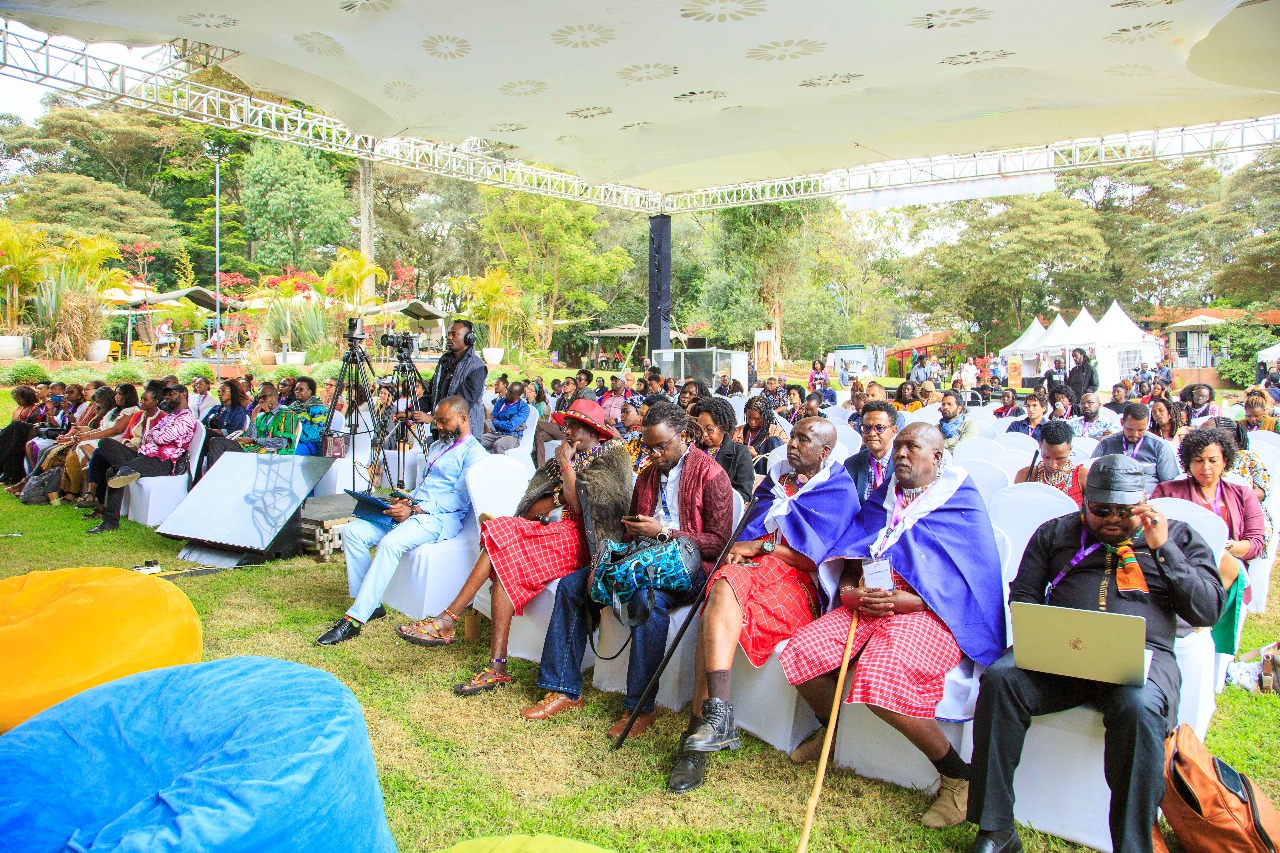 Participants during the Wakati Wetu festival at Entim Sidai in Nairobi, Kenya./HANDOUT
Participants during the Wakati Wetu festival at Entim Sidai in Nairobi, Kenya./HANDOUT"Reparations can be used as a tool of reform by demanding that wealth extracted through IFFs be restored," Wambui explained, "including wealth polluted by financial means, looting of natural resources, of cultural artifacts, intellectual property."
Riva Jalipa traced the historical pattern: "When slavery was abolished, it is the slave owners who were compensated." She pointed to Haiti, forced to pay an independence debt for political recognition, a pattern repeated across Africa where countries had to "forego a certain level of economic sovereignty in order to get political sovereignty."
Mukasiri Sibanda delivered a sharp rebuke to technocratic obfuscation: "You put people through a pace of very technocratic conversation when the simple issue is about the tent which is missing. When we are talking about justice, this is how we have to face justice as it is."
A Revolutionary Platform
Dr. Natasha Shivji urged African states to take ownership of the reparation’s agenda, reframing it as internal revolutionary work rather than external pleading. "Reparations are not just demands on the outside world; they are demands on the State to organize history into a revolutionary platform, not a plea for sympathy," she told the audience.
Scholar Yoporeka Somet emphasized reconnection with pre-colonial African heritage as foundational to the healing process. "We existed before slavery. We existed before colonialism," Somet reminded participants. "You cannot talk about renaissance if you do not know your history."
The plenary sessions explored how universities have become consumer-driven businesses under state control, creating tensions between academic goals and market demands. Current decolonization efforts, speakers warned, must avoid replicating the centralized, bureaucratic systems that limit genuine change.
Centering Black Women's Bodies and Voices
On the main stage, the discussion on Reparations & Gender brought powerful testimony from activists fighting on multiple fronts. Janira Sodré spoke about the global Black Women's March movement: "In 2015 we were only 100 black women represented, apparently a decade later we are in millions. Representation is clearly global."
Tassia Mendonça emphasized that the march represents "our ancestral roots, what we are and what we stand for. In the Brazil community, you would only see white representation, now we are going hard to have black women representation."
Lavender Namdiero, moderating the session, articulated decolonial feminism's call: "The act of reclamation, to remember and to revalue the knowledge, the solidarities and spiritualities that colonialism sought to erase; it asks us to create and center African Women's lived experiences as a source of wisdom, resistance and renewal."
Grace Namugambe outlined what feminist reparative frameworks must include: "Recognizing collective and intergenerational harm. It must center reproductive and bodily autonomy, recognizing colonial and post-colonial culture over black women's bodies as essential harm, with reparative measures including things like free reproductive health care, legal reforms and cultural recognition of indigenous birthing knowledge."
Omolara Oriye challenged the dismissal of African women's critiques: "Anti colonial work is the work of creation. It is work that is achieved through sustained, political, epistemic, embodied resistance. It is insisting that what I am feeling is real, what I am seeing is real."
Nombuso Mathibela grappled with a fundamental tension: "One of the difficulties of a reparations discussion is that we're trying to repair a past that is persistent. We're trying to work through a particular kind of revolutionary failure, yet the past actually persists."
Media as Colonial Tool
In a session examining media's role in colonial narratives, researcher Ngartia Muruthi noted that colonial-era newspapers were the biggest tool for propaganda. "Kenya specifically was advertised as white man's country," Muruthi explained. "You can still find a lot of them at the Macmillan library."
Journalist Christine Mungai challenged her fellow media practitioners to actively resist these inherited conventions. "It takes a lot of bravery, a lot of courage, like going against the grain and actually training yourself to not fall into these conventions," she said.
Hon. Paul Muite, drawing from his work on the landmark Mau Mau reparations case, emphasized that successful litigation requires accurate historical documentation. "In order for at least the Mau Mau case to succeed, and I suspect many other cases about reparation, the starting point is research in terms of accurate record on who was who, who did what, with their names," he explained.
He also noted what he called the "third betrayal” when those who took power from colonial masters refused to acknowledge freedom fighters. "They did not want to hear about Mau Mau, about the freedom fighters. Muite stated.
Art as Resistance and Healing
Under the cultural theme "Confronting the Silence," the festival featured performances by Eric Wainaina, DJ Talie, Koko Koseso, and NiK DJ, with poetry, murals, and films transforming the venue into a living archive of memory.
Jordanka Waiyaki facilitated art therapy sessions, explaining their importance: "This is training the muscle to think and check in with yourself and check out of yourself, be able to represent it in a very expressive way." She reminded participants of their relationship with rest, joy, and creativity as essential components of the reparations journey.
Wainaina, known for his anti-corruption anthem "Nchi ya Kitu Kidogo" and his history of using music to fight abuses of justice, brought his signature blend of activism and artistry to the festival stage. Screenings of "If Objects Could Speak" and "How to Build a Library" explored stolen African artifacts and erased memories, adding to the conversation on cultural restitution.
Festival convener Liliane Umubyeyi, Executive Director of the African Futures Lab, described the event's mission as both political and creative. "We are here because justice is a cultural and political question. Our shared creation has the power to renew our understanding of our place in history. The time is truly ours, Ni Wakati Wetu!"
In her closing remarks to one session, Dr. Liliane Umubyeyi challenged participants: "If we want to build solidarity in these ecosystems, we have to be aware of these contradictions. We have to highlight the contradiction, expose them and address them."
Rejecting the Victim Narrative
In perhaps her most stirring passage, Owuor rejected the pathetic African narrative. "I reject poor, victimized African narrative. The trope of the pathetic African with flies in their eyes is no longer tenable," she said. "Reparations, if pursued, must reinforce African sovereignty and self-determined development."
She also confronted what she called Africa's "psychic colonization" the internalized belief that power, innovation, and destiny live elsewhere. "I hate our internalized belief that power, innovation and destiny live elsewhere, that we are not the center of the world," Owuor declared. "To hold such wealth, such demography, such cosmic inheritance, and still believe we are peripheral is a sickness."
It was a diagnosis that resonated throughout the sanctuary, where participants from over 20 countries had gathered precisely to cure that sickness to assert centrality, to demand truth, to refuse the script.
What Reparations Actually Mean
As the Cameroon study articulates, climate reparations include three key elements: an apology, monetary or other compensation, and most importantly, a guarantee of non-repetition which means rapid decarbonization and systemic transformation of the global economy.
The study emphasizes that reparations must differ fundamentally from development aid, which often serves donor interests, pushes for privatization, adds to debt burdens, and perpetuates subordination. True reparations, by contrast, center liberation and self-determination.
Esther Mwaniki synthesized the insight emerging across sessions: "It's not possible for us to talk about a real conversation for reparations without asking about the place of the financial systems in enabling the chaos that we are in. It's not about just payouts. It's about the power behind it, about the Justice healing, the disordered relationships between people, planet, between governance, morality, whatever that looks like, between the present and the past."
Mary Morrison emphasized the need for grounded, contextualized action: "It's asking those questions to understand in our own perspective, what climate justice means, what climate reparations mean. And from that aspect, we'll be building actions that are geared towards particular people on the ground."
This framework illuminated why Owuor's insistence on truth-telling was so crucial. Without confronting the full scope of historical harm without the "moral autopsy” any compensation becomes merely another form of aid, another transaction that maintains rather than transforms power relations.
A Vision for the Future
The festival closed with a powerful keynote by Brian Kagoro on "Vision for the Future," bringing the gathering full circle from diagnosis to prescription.
Kagoro, Managing Director of Programs at the Open Society Foundations, emphasized that "reparative justice is not about the past alone, it is about reclaiming Africa's future, restoring dignity, and rebuilding our sovereignty." He reminded participants that repair is a living, collective responsibility rooted in empowerment and accountability. His reflections challenged the audience to move beyond rhetoric and build real ecosystems of repair grounded in African agency and imagination.
"The debt of slavery, colonialism, and systemic exploitation remains unpaid. Africa's call for reparations is a call for justice, not charity," Kagoro declared. He emphasized that "reparations must be rooted in reform: from financial fairness to fair global governance where Africa has an equal seat at the table."
Kagoro, a Pan-Africanist who has been campaigning for reparations for 25 years, stressed that "if you want to undo the system that reproduces intergenerational poverty, you have to do reparations. And it's not just about compensation." He elaborated that the reparations agenda addresses current conditions of Africans including underdevelopment, poverty, food insecurity, climate injustices and pandemics.
Kagoro has been advocating for concrete mechanisms, including an international tribunal modeled on the Nuremberg trials, to establish an "official record of history" and create legal norms for complex international reparations claims.
His closing address provided what the festival had promised from the start: not just analysis of wounds, but a blueprint for healing that centers African self-determination.
Building from the Ground Up
Aziza Braekevelt articulated the foundation required: "We need to first start by building community based on empowering them intellectually, leading to an economic empowerment of our communities by providing history training and teaching on African histories."
Taofik reminded participants of the power of direct communication in movements: "Curiosity may kill a cat, but as people, it skills us. So we must use the power of words, being direct, being clear when we are talking about justice."
A Movement Born
The festival, co-organized by African Futures Lab, Baraza Media Lab, AU-ECOSOCC, and Reform Initiatives, with partners including Amnesty International, Trust Africa, and the Deep South Solidarity Fund, aimed to make Africa the epicenter of demands for justice and reparations while strengthening alliances between the diaspora and the people of the continent.
Over two days, sessions tackled tax justice, climate reparations, gendered reparations, and strategic litigation. Participants engaged with UN Special Rapporteurs, grassroots activists, and continental policymakers. They watched films, created art, and built networks that would outlast the festival itself.
The vision that emerged was clear: As the African Union prepares to launch the Decade of Reparations, the Wakati Wetu Festival stood as a declaration that Africa will no longer plead for justice, it will define it.
Walking through the grounds of Entim Sidai as the festival concluded, past completed murals that the festival called engaging wall and deep connections were made, one could sense the weight of what had transpired.
From Haiti to Cameroon, from the Caribbean to East Africa, the evidence was mounting. The calculations were being made. The illicit financial flows were being traced. The false solutions were being exposed. The songs were sung.
And the message was unmistakable: this was not just a festival. It was a movement announcing its arrival armed with forensic economics, lived experience, 25 years of advocacy work, decolonial feminist frameworks, and an unshakeable conviction that the time for pleading had passed. Nairobi hosted the beginning.
Now comes the work of a decade and beyond.











